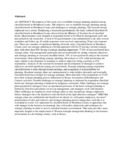| dc.description.abstract | The purpose of this study was to establish strategic planning adopted among classified hotels in Mombasa County. The objective was to establish strategic planning among classified hotels in Mombasa County and challenges to strategic planning. The research design employed was a census. Employing a structured questionnaire, the study collected data from 64 classified hotels in Mombasa County derived from the Ministry of Tourism list of classified hotels. Questionnaires were dropped at respondent hotels to be filled by management staff; and later picked by the researcher. A total of 64 questionnaires were administered to all, after several reminders and follow up; 45 usable responses were received, representing 70 per cent response rate. There are a number of significant findings from the study: Classified hotels in Mombasa County carry out strategic planning in a formal approach with 62.2% having a formal strategic plan; with more than 50% having a strategic planning department. 77.8% of surveyed hotels have strategic plans. Top management participate and are responsible for setting corporate objectives and strategic planning in surveyed classified hotels. 33% of surveyed hotels analyze the external environment while undertaking strategic planning; this reduces to 22% while prioritizing the steps; similar to development of strategies to achieve objectives being a priority at 22% respondents. Analysis of the external environment and development of strategies to achieve objectives are both significant among surveyed hotels. Strategic planning among respondent classified hotels is done through formal meetings; and assignment of responsibilities for planning. Resultant strategic plans are communicated to stake holders internally and externally. Classified hotels have budget for strategic planning. More than half of the respondents at 57.8% have their strategic planning process influenced by Kenya Association of Hotelkeepers and Caterers activities. Notable challenges to strategic planning as indicated by respondent classified hotels are; Strategic planning is hindered by budgetary constraints. Other challenges are strategic plans prepared by managers focus on operational processes of the hotel; strategic planning is limited by laid down procedures set by top management; and managers work with intuition. Other challenges are employees resist strategic plans as they incorporate change; employees believe managers have the intuition to take the hotel in the right direction; managers‟ belief that strategic plans are confidential and should not be shared
xiv
with junior employees; investors‟ prioritization of sales and turnover; and strategic planning process taking time, such that it is overtaken by events. It is important for classified hotels in Mombasa County to appreciate that with changes in the business environment, they will need to adopt tools and techniques for strategic planning in order to survive turbulent business environment. This study provides some important insights to the employment of Western strategic management thinking to the business environment in a developing country, such as Kenya. | en |

